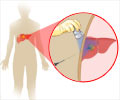Liver cancer patients from rural regions and lower-income households are more likely to be diagnosed with advanced cancer and face a higher risk of death than other patients, finds a new study.

‘Liver cancer patients in more rural regions had 10 percent higher odds of having advanced liver cancer at the time of diagnosis and 5 percent higher odds of dying than patients in large metro areas.
’





This database includes information from 21 U.S. regions, representing approximately 35 percent of the U.S. population. From 2004 to 2017, there were 83,237 adults with liver cancer, among which 49.1 percent had localized disease at the time of diagnosis, and 14.4 percent had advanced disease that had spread.
The team found that compared with patients in large metro areas with a population of more than 1 million people, patients in more rural regions had 10 percent higher odds of having advanced liver cancer at the time of diagnosis and 5 percent higher odds of dying. Also, compared with patients with an annual household income of at least $70,000, patients with an annual household income below $40,000 had 15 percent higher odds of having advanced cancer at the time of diagnosis and 23 percent higher odds of dying.
"While our study could not specifically investigate the reasons for the worse liver cancer outcomes, we hypothesize that patients are living in more rural regions and among lower-income households likely experience healthcare disparities leading to sub-optimal access to high-quality liver disease care, including timely receipt of liver cancer surveillance and access to liver disease specialists," said Dr. Wong.
"Our study highlights the need to focus on understanding the drivers of poor liver cancer outcomes among underserved and vulnerable populations, including those in rural geographic regions or among low-income households, so that targeted quality improvement interventions can more specifically address the needs of these populations. We also hope that our findings will raise greater awareness of challenges and limited resources that contribute to sub-optimal liver disease care experienced by patients from low-income and rural households."
Advertisement
Source-Eurekalert















